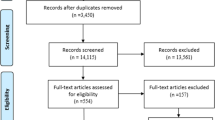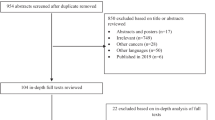Abstract
Purpose
The functional assessment of cancer therapy-gastric (FACT-Ga) questionnaire was designed to evaluate quality of life (QOL) in patients with gastric cancer. We aimed to explore the reliability and validity of FACT-Ga in Japanese patients, and assess the sensitivity of the gastric cancer subscale for detecting changes in cancer-related variables over time.
Methods
The Japanese version of FACT-Ga was used, and data were obtained from Japanese patients who participated in either of two clinical trials: treatment for advanced or recurrent gastric cancer with ascites (advanced-GC group), or adjuvant chemotherapy after curative resection of gastric cancer (adjuvant group). Psychometric data including data used to determine reliability, internal consistency, and clinical validity were analyzed. Clinical validity was evaluated by comparing subscale scores for patients in the two groups, and by comparing subscale scores for patients with different performance status scores. Correlation between gastric cancer subscale scores and gastric cancer-related variables was also examined. In addition, sensitivity of the gastric cancer subscale to changes in ascites volume, abdominal girth, and Eastern Cooperative Oncology Group (ECOG) performance status (PS) was examined by evaluating their correlation in the advanced-GC group.
Results
We collected data on 156 patients (62 advanced-GC group patients and 94 adjuvant group patients). Response rates for the subscales were over 80 % at most time points for both the groups. Cronbach’s coefficient alpha revealed good internal consistency for each subscale. At baseline, the adjuvant group had higher QOL scores than the advanced-GC group (P < 0.05), and QOL scores for patients with different performance status scores differed significantly. Changes in gastric cancer subscale scores showed statistically significant correlation with changes in ascites volume (Spearman’s rank correlation coefficient, 0.5; P < 0.05).
Conclusions
FACT-Ga is reliable and clinically valid for Japanese patients with gastric cancer. Detection of QOL changes that correlate with ascites volume changes suggests that it could be used more broadly; FACT-Ga scores could be used as an endpoint for patients with gastric cancer-related ascites.

Similar content being viewed by others
References
Quinten C, Coens C, Mauer M, Comte S, Sprangers MA, Cleeland C, et al. (2009) Baseline quality of life as a prognostic indicator of survival: a meta-analysis of individual patient data from EORTC clinical trials. Lancet Oncol 10(9):865–871
Shan B, Shan L, Morris D, Golani S, Saxena A (2015) Systematic review on quality of life outcomes after gastrectomy for gastric carcinoma. J Gastrointest Oncol 6(5):544–560
Morita S, Kaptein AA, Tsuburaya A, Kodera Y, Matsui T, Sakamoto J (2006) Assessment and data analysis of health-related quality of life in clinical trials for gastric cancer treatments. Gastric Cancer 9(4):254–261
Eremenco SL, Cashy J, Webster K, Ohashi Y, Locker GY, Pelletier G, et al. (2004) FACT-gastric: a new international measure of QOL in gastric cancer. J Clin Oncol 22(14S):8123
Webster K, Cella D, Yost K (2003) The functional assessment of chronic illness therapy (FACIT) measurement system: properties, applications, and interpretation. Health Qual Life Outcomes 16:79
Eremenco SL, Cella D, Arnold BJ (2005) A comprehensive method for the translation and cross-cultural validation of health status questionnaires. Eval Health Prof 28(2):212–232
Garland SN, Pelletier G, Lawe A, Biagioni BJ, Easaw J, Eliasziw M, et al. (2011) Prospective evaluation of the reliability, validity, and minimally important difference of the functional assessment of cancer therapy-gastric (FACT-Ga) quality-of-life instrument. Cancer 117(6):1302–1312
Debb SM, Arnold B, Perez B, Cella D (2011) Validation of the FACT-gastric cancer quality of life questionnaire for use in Spanish-speaking countries. Psychooncology 20(1):19–27
Zhou HJ, So JB, Yong WP, Luo N, Zhu F, Naidoo N, et al. (2012) Validation of the functional assessment of cancer therapy-gastric module for the Chinese population. Health Qual Life Outcomes 10:145
Sakamoto J, Morita S, Yumiba T, Narahara H, Kinoshita K, Nakane Y, et al. (2003) A phase II clinical trial to evaluate the effect of paclitaxel in patients with ascites caused by advanced or recurrent gastric carcinoma: a new concept of clinical benefit response for non-measurable type of gastric cancer. Jpn J Clin Oncol 33(5):238–240
Imamoto H, Oba K, Sakamoto J, Iishi H, Narahara H, Yumiba T, et al. (2011) Assessing clinical benefit response in the treatment of gastric malignant ascites with non-measurable lesions: a multicenter phase II trial of paclitaxel for malignant ascites secondary to advanced/recurrent gastric cancer. Gastric Cancer 14(1):81–90
Oriuchi N, Nakajima T, Mochiki E, Takeyoshi I, Kanuma T, Endo K, et al. (2005) A new, accurate and conventional five-point method for quantitative evaluation of ascites using plain computed tomography in cancer patients. Jpn J Clin Oncol 35(7):386–390
Tsuburaya A, Sakamoto J, Morita S, Kodera Y, Kobayashi M, Miyashita Y, et al. (2005) A randomized phase III trial of post-operative adjuvant oral fluoropyrimidine versus sequential paclitaxel/oral fluoropyrimidine; and UFT versus S1 for T3/T4 gastriccarcinoma: the Stomach Cancer Adjuvant Multi-institutional Trial Group (Samit) Trial. Jpn J Clin Oncol 35(11):672–675
Tsuburaya A, Yoshida K, Kobayashi M, Yoshino S, Takahashi M, Takiguchi N, et al. (2014) Sequential paclitaxel followed by tegafur and uracil (UFT) or S-1 versus UFT or S-1 monotherapy as adjuvant chemotherapy for T4a/b gastric cancer (SAMIT): a phase 3 factorial randomised controlled trial. Lancet Oncol 15(8):886–893
Streiner DL (2003) Starting at the beginning: an introduction to coefficient alpha and internal consistency. J Pers Assess 80(1):99–103
Global Burden of Disease Cancer Collaboration, Fitzmaurice C, Dicker D, Pain A, Hamavid H, Moradi-Lakeh M, MacIntyre MF, et al. (2015) The global burden of cancer 2013. JAMA Oncol 1(4):505–527
Nakajima T, Nishi M, Kajitani T (1991) Improvement in treatment results of gastric cancer with surgery and chemotherapy: experience of 9,700 cases in the Cancer Institute Hospital, Tokyo. Semin Surg Oncol 7(6):365–372
Shan B, Shan L, Morris D, Golani S, Saxena A (2010) Systematic review on quality of life outcomes after gastrectomy for gastric carcinoma. J Gastrointest Oncol 6(5):544–560
Japanese Gastric Cancer Association (2011) Japanese gastric cancer treatment guidelines 2010 (ver. 3). Gastric Cancer 14(2):113–123
Maeda H, Kobayashi M, Sakamoto J (2015) Evaluation and treatment of malignant ascites secondary to gastric cancer. World J Gastroenterol 21(39):10936–10947
Bodoky G, Scheulen ME, Rivera F, Jassem J, Carrato A, Moiseyenko V, et al. (2015) Clinical benefit and health-related quality of life assessment in patients treated with cisplatin/S-1 versus cisplatin/5-FU: secondary end point results from the First-Line Advanced Gastric Cancer Study (FLAGS). J Gastrointest Cancer 46(2):109–117
Munene G, Francis W, Garland SN, Pelletier G, Mack LA, Bathe OF (2012) The quality of life trajectory of resected gastric cancer. J Surg Oncol 105(4):337–341
Levine MN, Ganz PA (2002) Beyond the development of quality-of-life instruments: where do we go from here? J Clin Oncol 20(9):2215–2216
Cheung YB, Daniel R, Ng GY (2006) Response and non-response to a quality-of-life question on sexual life: a case study of the simple mean imputation method. Qual Life Res 15(9):1493–1501
Acknowledgment
The part of this study was presented in 2016 ESMO World Congress on Gastrointestinal Cancer held on 29 June–2 July, in Barcelona, Spain.
Author information
Authors and Affiliations
Corresponding author
Ethics declarations
Ethics approval
All procedures performed in studies involving human participants were in accordance with the ethics standards of the institutional and/or national research committee and with the 1964 Helsinki Declaration and its later amendments or comparable ethics standards.
Conflict of interest
The authors declare that they have no conflict of interest.
Financial support
This study was supported by the Epidemiological and Clinical Research Information Network (ECRIN), a non-profit organization.
Additional information
Hiromichi Maeda and Maho Sato contributed equally to this work.
Rights and permissions
About this article
Cite this article
Maeda, H., Sato, M., Kobayashi, M. et al. Validity of the Japanese version of functional assessment of cancer therapy-gastric (FACT-Ga) and its sensitivity to ascites volume change: a retrospective analysis of Japanese clinical trial participants. Support Care Cancer 24, 4515–4521 (2016). https://doi.org/10.1007/s00520-016-3290-3
Received:
Accepted:
Published:
Issue Date:
DOI: https://doi.org/10.1007/s00520-016-3290-3




